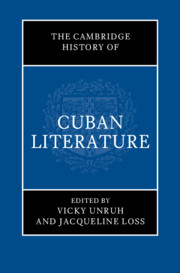Book contents
- The Cambridge History of Cuban Literature
- The Cambridge History of Cuban Literature
- Copyright page
- Dedication
- Contents
- Figures
- Contributors
- Acknowledgments
- Introduction Unfinished Histories
- Part I Literature in the Early Colony
- 1 Silvestre de Balboa’s Espejo de paciencia and the Unfinished Foundational Story of Cuban Literature
- 2 José Martín Félix de Arrate’s Enlightenment Discourse of Cuban Exceptionalism
- Part II Cuban Literature’s Long Nineteenth Century
- Part III Literary and Intellectual Culture in the Twentieth-Century Republic
- Part IV The Revolution’s Literary-Cultural Initiatives and Their Early Discontents
- Part V Cuba and Its Diasporas into the New Millennium
- Epilogue
- Select Bibliography
- Index
- References
1 - Silvestre de Balboa’s Espejo de paciencia and the Unfinished Foundational Story of Cuban Literature
from Part I - Literature in the Early Colony
Published online by Cambridge University Press: 31 August 2024
- The Cambridge History of Cuban Literature
- The Cambridge History of Cuban Literature
- Copyright page
- Dedication
- Contents
- Figures
- Contributors
- Acknowledgments
- Introduction Unfinished Histories
- Part I Literature in the Early Colony
- 1 Silvestre de Balboa’s Espejo de paciencia and the Unfinished Foundational Story of Cuban Literature
- 2 José Martín Félix de Arrate’s Enlightenment Discourse of Cuban Exceptionalism
- Part II Cuban Literature’s Long Nineteenth Century
- Part III Literary and Intellectual Culture in the Twentieth-Century Republic
- Part IV The Revolution’s Literary-Cultural Initiatives and Their Early Discontents
- Part V Cuba and Its Diasporas into the New Millennium
- Epilogue
- Select Bibliography
- Index
- References
Summary
This chapter addresses the “lost” epic poem Espejo de paciencia (1608) by Silvestre de Balboa, which was rediscovered in 1836 and has, since then, been considered the first work of Cuban literature, a status that has also been contested. The poem narrates the 1604 kidnapping and freeing of a Spanish prelate, then Bishop of Cuba, by French pirates. The chapter first examines the poem’s archival history, the nineteenth-century debates about slavery and race that framed the poem’s consideration as a foundational work, and the debates into the twenty-first century contributing to the as-yet-unresolved question of its foundational status. The chapter then details Balboa’s imaginative recasting of European Renaissance conventions of the epic genre, in a version distinct to the Americas and with new epistemological consequences in the treatment of Cuban nature and in the literary creation of a distinct local territory of inhabitants, marked by a poetics of community and loaded with cultural heterogeneity.
Keywords
- Type
- Chapter
- Information
- The Cambridge History of Cuban Literature , pp. 41 - 51Publisher: Cambridge University PressPrint publication year: 2024

